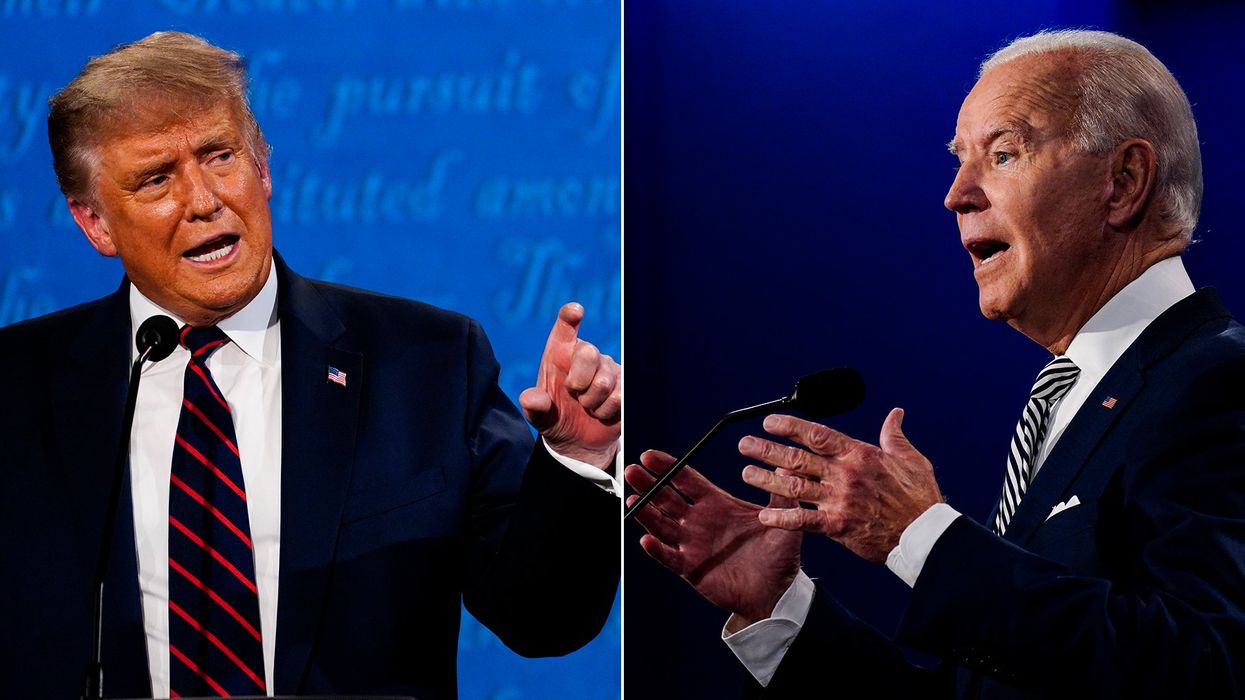Corbin is professor emeritus of marketing at the University of Northern Iowa.
Clowns to the left of me
Jokers to the right
Here I am
Stuck in the middle with you.
These are lyrics from the song “Stuck in the Middle With You,” co-written by Garry Rafferty and Joe Eagan and released by their band, Stealers Wheel, in 1972. The 43 percent of voters who are independent would agree that the line “stuck in the middle” speaks to them and our 2024 presidential election.
On March 12, Joe Biden and Donald Trump locked up their respective political party nominations, starting a 244-day campaign to Nov. 5. Research reveals the vast majority of registered Democrats are committed to vote for Biden despite his octogenarian age (though former special counsel Robert Hur told Congress that the president had “ photographic recall ”).
Likewise, research finds that MAGA Republicans will vote for Trump, regardless of past legal issues (e.g., $83.3 million E. Jean Carroll sexual abuse finding, New York’s $453.5 million Trump Organization litigation, 2005-2021 Trump Organization criminal tax fraud, etc.) and pending cases (2020 federal election interference, Georgia’s RICO case over 2020 election interference, stolen classified documents, 2016 porn star hush-money election interference and 34 counts of falsifying business records).
Research also shows that due to Democratic and Republican polarization, independents will determine – on Nov. 5 – who will be America’s president in 2025.
A number of Democratic and Republican loyalists are turning against their respective party’s designated candidate. Let’s explore that issue.
Joe Biden
Back in the summer of 2022, Politico reported that RootsAction – a left-wing activist group that supported Biden’s 2020 election, tried to persuade him not to run in 2024. Se leve.
There’s sufficient rumbling that some Black, Latino and young voters are suspicious of supporting Biden again in 2024. However, 15 millennials and members of Generation Z recently endorsed Biden and joined the Students for Biden-Harris coalition in arguing that his achievements supersede his age.
Gallup’s annual governance poll reveals 63 percent of voters want a third-party choice. American Bridge, Third Way, MoveOn and Save our Republic PAC – all left-of-center groups – worry the centrist group No Labels and political activists Robert F. Kennedy, Cornel West and Jill Stein will take votes away from Biden.
Third-party candidates are Biden’s biggest re-election threat.
Donald Trump
Turmoil in Trump’s world is more troubling than in the Biden camp. Business Insider reports 40 of Trump’s 44 former cabinet members (91 percent) are not endorsing his 2024 candidacy. Wikipedia’s “List of Republicans who oppose the Donald Trump presidential campaign” features 128 individuals, from party leaders to judges to members of Congress to a former president.
Trump’s former attorney general Bill Barr testified before Congress that Trump is “a troubled man” who must face justice. Former Vice President Mike Pence announced on Fox News that his ex-boss has strayed too far from conservative philosophy. Both are not endorsing Trump’s campaign.
A GOP group calling itself Republican Voters Against Trump launched a $50 million ad campaign featuring first-person video testimonials of more than 100 former Trump voters.
The Guardian notes Fox News on-air personalities’ relationship with Trump started eroding with the Jan. 6, 2021, coup attempt and ensuing $1.6 billion lawsuit by Dominion against the network.
On Jan. 25, the Wall Street Journal (like Fox, controlled by the Murdoch family) criticized Trump for meddling in congressional talks on border security and his blatant threat to permanently bar Republicans from the MAGA camp who supported Nikki Haley’s campaign. The Journal called his actions “a high act of self-sabotage” and “it would be a good reason to vote for someone else.”
The WSJ-Trump romance has been eroding for years as witnessed by the editorial board’s leading op-ed on Nov. 9, 2022, titled “Trump Is the Republican Party’s Biggest Loser.”
Biden and Trump
Turnover of employees is a standard measure of business stability (or chaos). Trump had a 35 percent first-year turnover of senior executives while Biden only had an 8 percent first-year turnover. By Trump’s last day of office, 60 of the 65 senior executives (92 percent) had left his administration. Currently, Biden’s turnover rate is 71 percent.
Between now and Nov. 5, continue to do your independent homework, versus being a lemming and getting hoodwinked by the political parties’ disinformation, misinformation and propaganda.
Let’s admit it. We have clowns to the left, jokers to the right and here I am – like 43 percent of voters – stuck in the middle with you.




















Trump & Hegseth gave Mark Kelly a huge 2028 gift